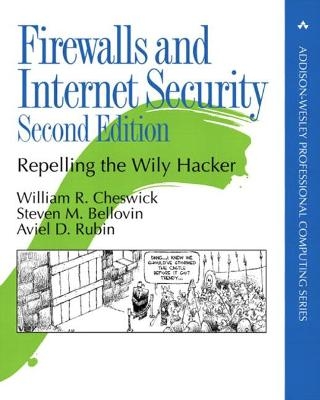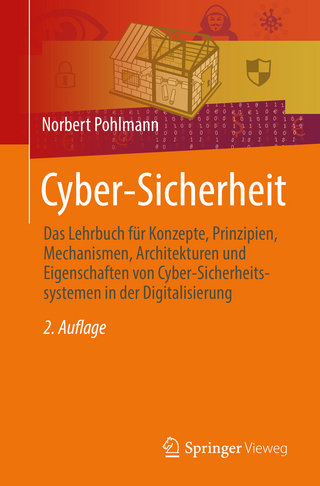
Firewalls and Internet Security
Addison Wesley (Verlag)
978-0-201-63466-2 (ISBN)
The best-selling first edition of Firewalls and Internet Security became the bible of Internet security by showing readers how to think about threats and solutions. The completely updated and expanded second edition defines the security problems students face in today's Internet, identifies the weaknesses of the most popular security technologies, and illustrates the ins and outs of deploying an effective firewall. Students learn how to plan and execute a security strategy that allows easy access to Internet services while defeating even the wiliest of hackers. Written by well-known senior researchers at AT&T Bell Labs, Lumeta, and Johns Hopkins University the students will benefit from the actual, real-world experiences of the authors maintaining, improving, and redesigning AT&T's Internet gateway.
William R. Cheswick (http://cheswick.com) is Chief Scientist at Lumeta Corporation, which explores and maps clients' network infrastructures and finds perimeter leaks. Formerly he was a senior researcher at Lucent Bell Labs, where he did pioneering work in the areas of firewall design and implementation, PC viruses, mailers, and Internet munitions. Steven M. Bellovin (http://stevebellovin.com) is a Fellow at AT&T Labs Research, where he works on networks, security, and, especially, why the two don't get along. He is a member of the National Academy of Engineering and is one of the Security Area directors of the Internet Engineering Task Force. Long ago he was one of the creators of NetNews. Aviel D. Rubin (http://avirubin.com) is an Associate Professor in the Computer Science Department at Johns Hopkins University and serves as the Technical Director of their Information Security Institute. He was previously Principal Researcher in the Secure Systems Research Department at AT&T Laboratories and is the author of several books. 020163466XAB01302003
Preface to the Second Edition.
Preface to the First Edition.
I. GETTING STARTED.
1. Introduction.
Security Truisms.
Picking a Security Policy.
Host-Based Security.
Perimeter Security.
Strategies for a Secure Network.
The Ethics of Computer Security.
WARNING.
2. A Security Review of Protocols: Lower Layers.
Basic Protocols.
Managing Addresses and Names.
IP Version 6.
Network Address Translators.
Wireless Security.
3. Security Review: The Upper Layers.
Messaging.
Internet Telephony.
RPC-Based Protocols.
File Transfer Protocols.
Remote Login.
Simple Network Management Protocol-SNMP.
The Network Time Protocol.
Information Services.
Proprietary protocols.
Peer-to-Peer Networking.
The X11 Window System.
The Small Services.
4. The Web: Threat or Menace?
The Web Protocols.
Risks to the Clients.
Risks to the Server.
Web Servers vs. Firewalls.
The Web and Databases.
Parting Thoughts.
II. THE THREATS.
5. Classes of Attacks.
Stealing Passwords.
Social Engineering.
Bugs and Backdoors.
Authentication Failures.
Protocol Failures.
Information Leakage.
Exponential Attacks-Viruses and Worms.
Denial-of-Service Attacks.
Botnets.
Active Attacks.
6. The Hacker's Workbench, and Other Munitions.
Introduction.
Hacking Goals.
Scanning a Network.
Breaking into the Host.
The Battle for the Host.
Covering Tracks.
Metastasis.
Hacking Tools.
Tiger Teams.
III. SAFER TOOLS AND SERVICES.
7. Authentication.
Remembering Passwords.
Time-Based One-Time Passwords.
Challenge/Response One-Time Passwords.
Lamport's One-Time Password Algorithm.
Smart Cards.
Biometrics.
RADIUS.
SASL: An Authentication Framework.
Host-to-Host Authentication.
PKI.
8. Using Some Tools and Services.
Inetd-Network Services.
Ssh-Terminal and File Access.
Syslog.
Network Administration Tools.
Chroot-Caging Suspect Software.
Jailing the Apache Web Server.
Aftpd-A Simple Anonymous FTP Daemon.
Mail Transfer Agents.
POP3 and IMAP.
Samba: An SMB Implementation.
Taming Named.
Adding SSL Support with sslwrap.
IV. FIREWALLS AND VPNS.
9. Kinds of Firewalls.
Packet Filters.
Application-Level Filtering.
Circuit-Level Gateways.
Dynamic Packet Filters.
Distributed Firewalls.
What Firewalls Cannot Do.
10. Filtering Services.
Reasonable Services to Filter.
Digging for Worms.
Services We Don't Like.
Other Services.
Something New.
11. Firewall Engineering.
Rulesets.
Proxies.
Building a Firewall from Scratch.
Firewall Problems.
Testing Firewalls.
12. Tunneling and VPNs.
Tunnels.
Virtual Private Networks (VPNs).
Software vs. Hardware.
V. PROTECTING AN ORGANIZATION.
13. Network Layout.
Intranet Explorations.
Intranet Routing Tricks.
In Host We Trust.
Belt and Suspenders.
Placement Classes.
14. Safe Hosts in a Hostile Environment.
What Do We Mean by “Secure”?
Properties of Secure Hosts.
Hardware Configuration.
Field Stripping a Host.
Loading New Software.
Administering a Secure Host.
Skinny-Dipping: Life Without a Firewall.
15. Intrusion Detection.
Where to Monitor.
Types of IDS.
Administering an IDS.
IDS Tools.
VI. LESSONS LEARNED.
16. Une Soirie avec Berferd.
Introduction.
Unfriendly Acts.
An Evening with Berferd.
The Day After.
The Jail.
Tracing Berferd.
Berferd Comes Home.
17. The Taking of Clark.
Prelude.
Clark.
Crude Forensics.
Examining Clark.
The Password File.
How Did They Get In?
Better Forensics.
Lessons Learned.
18. Secure Communications over Insecure Networks.
An Introduction to Cryptography.
The Kerberos Authentication System.
Link-Level Encryption.
Network-Level Encryption.
Application-Level Encryption.
19. Where Do We Go from Here?
IPv6.
DNSsec.
Internet Ubiquity.
Internet Security.
Conclusion.
A. An Introduction to Cryptography.
Introduction.
B. Keeping up.
Bibliography.
List of Bombs.
List of Acronyms.
Index. 020163466XT01082003
| Erscheint lt. Verlag | 4.3.2003 |
|---|---|
| Reihe/Serie | Addison-Wesley Professional Computing Series |
| Mitarbeit |
Herausgeber (Serie): JOHN FULLER |
| Verlagsort | Harlow |
| Sprache | englisch |
| Maße | 188 x 235 mm |
| Gewicht | 980 g |
| Themenwelt | Informatik ► Netzwerke ► Sicherheit / Firewall |
| Informatik ► Theorie / Studium ► Kryptologie | |
| Mathematik / Informatik ► Informatik ► Web / Internet | |
| ISBN-10 | 0-201-63466-X / 020163466X |
| ISBN-13 | 978-0-201-63466-2 / 9780201634662 |
| Zustand | Neuware |
| Haben Sie eine Frage zum Produkt? |
aus dem Bereich


